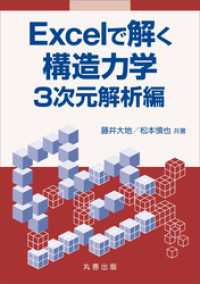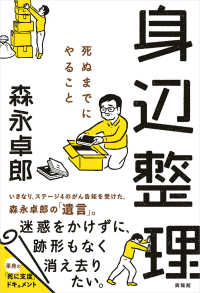- ホーム
- > 洋書
- > 英文書
- > Politics / International Relations
Full Description
A powerful new explanation of China's rise that draws from the business world to show that China is not simply copying established great powers, but exploiting geopolitical opportunities around the world that those other powers had ignored.
Thirty years ago, the idea that China could challenge the United States economically, globally, and militarily seemed unfathomable. Yet today, China is considered another great power in the international system. How did China manage to build power, from a weaker resource position, in an international system that was dominated by the U.S.? What factors determined the strategies Beijing pursued to achieve this feat?
Using elite interviews, granular data, and authoritative Chinese sources, Oriana Skylar Mastro demonstrates that China was able to climb to great power status through a careful mix of strategic emulation, exploitation, and entrepreneurship on the international stage. This "upstart approach" — determined by where and how China chose to compete — allowed China to rise economically, politically, and militarily, without triggering a catastrophic international backlash that would stem its rise. China emulated (i.e. pursued similar strategies to the U.S. in similar areas) when its leaders thought doing so would build power, while reassuring the U.S. of its intentions. China exploited (i.e. adopted similar approaches to the U.S. in new areas of competition) when China felt that the overall U.S. strategy was effective, but didn't want to risk direct confrontation. Lastly, China pursued entrepreneurial actions (i.e. innovative approaches to new and existing areas of competition) when it believed emulation might elicit a negative reaction and a more effective approach was available. Beyond explaining the unique nature of China's rise, Upstart: How China Became a Great Power provides policy guidance on how the U.S. can maintain a competitive edge in this new era of great power competition.
Contents
Acknowledgements
Abbreviations
Figures and Tables
China>'s Rise to the Great Power Club
Chapter One: The Upstart Strategy
Chapter Two: Emulation and Exploitation in Foreign Policy
Chapter Three: Entrepreneurship in Chinese Foreign Policy
Chapter Four: Emulation and Exploitation in Chinese Military Strategy
Chapter Five: Entrepreneurship in Military Strategy
Chapter Six: Emulation and Exploitation in Chinese Economic Policy
Chapter Seven: Entrepreneurship in Chinese Economic Power
Conclusion: Lessons for Great Power Competition
-

- 電子書籍
- Excelで解く構造力学 3次元解析編
-

- 電子書籍
- 猫語辞典(2)つれづれ猫日記






